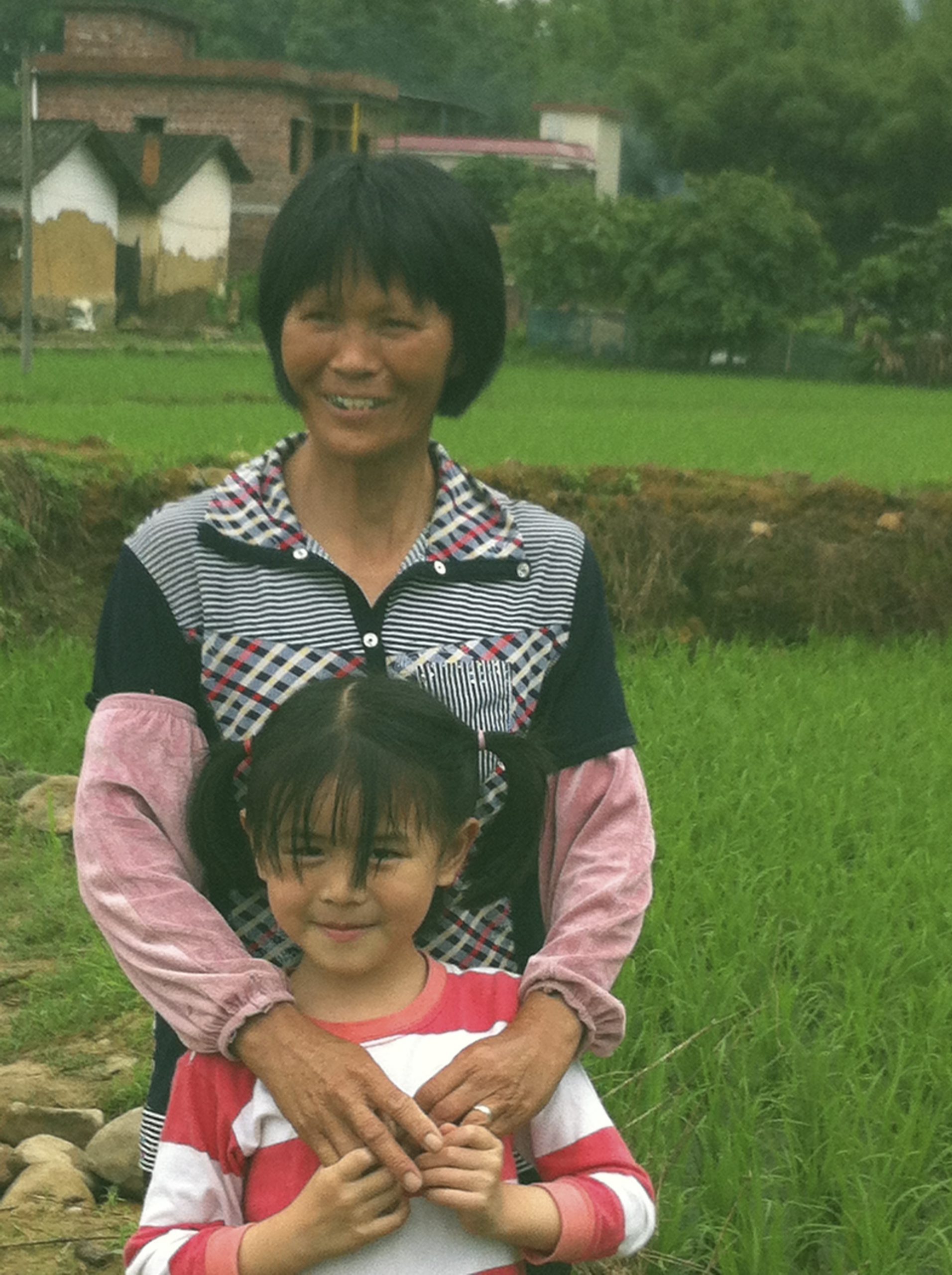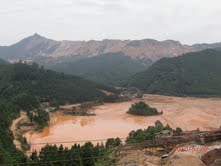
Farmer Youtian He’s wife and daughter near their polluted rice fields. Mrs. He and other relatives are suffering from cancer. He worries about his young daughter.
The bright green rice fields planted close to the brick-and-tile homes in Shangba, a small village in northern Guangdong Province in China, paint a tranquil, rural scene typical of China’s countryside.
What can’t be seen, and is difficult to imagine, are the heavy metals lacing the soil where the rice and sugar cane sprout. Cadmium, as well as copper, lead, zinc, iron, and arsenic have entered the soil of these agricultural fields from irrigation water polluted by the tailing pond of the Dabaoshan Mine.
The mine, a state-owned enterprise that has operated for more than 40 years producing iron and copper in Shaoguan city, lies about 16 kilometers upstream from the village.
Recent news of high levels of cadmium being found in rice sold in the city of Guangzhou have brought focus to the extent of heavy metal pollution throughout China. For some years, the Blacksmith Institute has worked to find ways of mitigating the effects of this pollution in the soil.
During the rainy season, about 80% of the rusty-colored water from the Dabaoshan Mine tailing pond rushes over a dam into the nearby Hengshishui River, instead of a waste treatment plant designed to handle the toxins in the water. A reservoir to supply clean drinking water and irrigation water was built by the provincial government in 2006 after years of complaints, but villagers who live downstream from the mine have to use the tainted water when the supply of clean water falls short.

Dabaoshan Mine tailing pond
As a result, cropland in Shangba and other villages is heavily polluted, resulting in poor plant growth, low yields, and evidence of heavy metals in the edible parts of plants, according to Nengchang Chen, a scientist with the Guangdong Institute of Eco-Environmental and Soil Sciences, who has worked with Blacksmith in the region.
With Blacksmith’s assistance, Mr. Chen has experimented with remediation techniques on the farmland soil of the Shangba administrative village, an area with about 3,400 people that is among the so-called “cancer villages” mapped by Chinese journalist Deng Fei in 2010.
According to Mr. Chen’s research, vegetables grown in Shangba have tested above national standards for copper, zinc, cadmium, lead and arsenic. Cadmium is of most concern as it is easily absorbed by plants, and appears to be causing kidney problems in Shangba’s population and is possibly contributing to high rates of cancer.
The scientist began studies in the area in 2005, and with Blacksmith’s assistance beginning in 2009, was able to complete further work using special strains of rice to “phyto-remediate” the soil. Phyto-remediation is the process of stimulating microorganisms already in the soil to speed up the transfer of toxins into carbon dioxide.
To do this, Mr. Chen plants a type of rice developed in Japan (choukokoku) that accumulates more cadmium than the average type of rice. The resulting crop is sold for use in metal recycling and as biomass for producing energy, he said. Mr. Chen also uses silica fertilizer on the contaminated soil as it can reduce the amount of cadmium that exists.
Mr. Chen’s work has been useful to other communities that are also grappling with soil contamination, such as Fenghuang County in Hunan Province and in Chengdu in Sichuan Province, he said.
In addition to the work in Guangdong, Blacksmith is working on other techniques as well. In Guixi City, Jiangxi Province, Blacksmith is piloting experiments using lime to reduce the toxicity of heavy metals introduced into the soil from one of the largest copper smelters in China.
Youtian He, a farmer in Shangba, has worked with Mr. Chen for many years on his fields of rice and sugar cane. But Mr. He’s wife is now suffering from cancer, as is a brother, and his young daughter remains threatened from the soil outside their home where she lives and plays. Reducing levels of cadmium throughout China, in Guangdong, Hunan, and elsewhere in the nation, remains critical to the health and safety of Mr. He’s family, the villagers of Shangba, and all of China’s population dependent on local agriculture.





